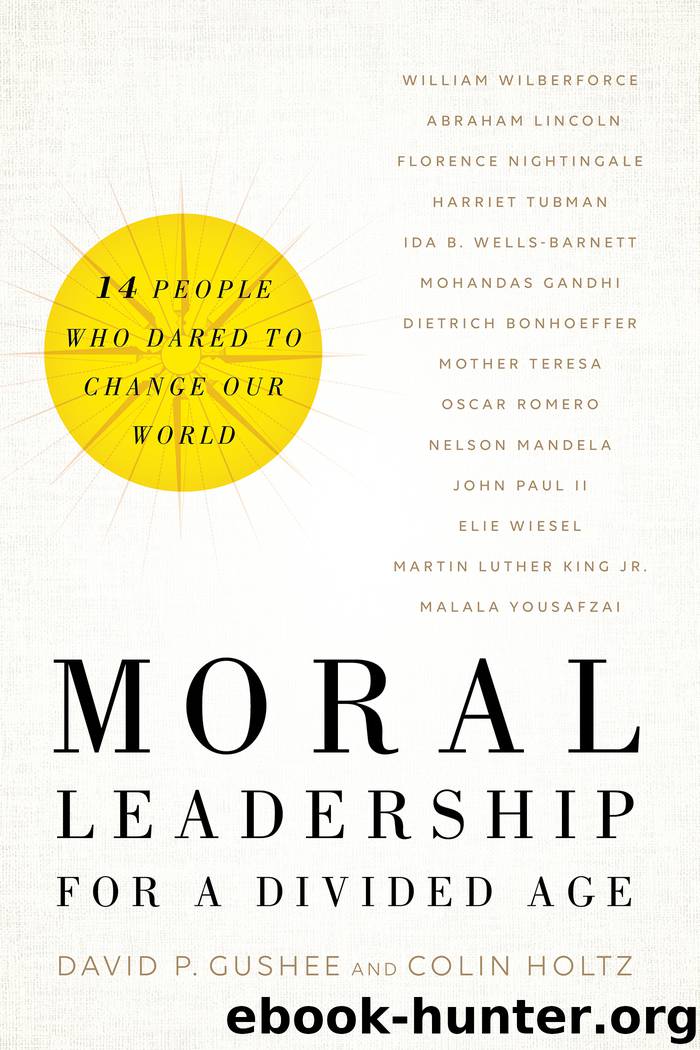Moral Leadership for a Divided Age by David P. Gushee

Author:David P. Gushee
Language: eng
Format: epub
Tags: Leadership/Biography;REL071000;REL028000;BIO018000
ISBN: 9781493415441
Publisher: Baker Publishing Group
Published: 2018-08-02T16:00:00+00:00
HISTORICAL CONTEXT
Mother Teresa’s homeland was a powder keg. The Balkan region has always included a broad range of religions and ethnicities united uncomfortably under foreign or contested rule. At the time of Mother Teresa’s birth, her home was part of the Ottoman Empire. An independent Albania arrived in 1912. The borders continued shifting for the rest of her life, and, today, her hometown is part of the Republic of Macedonia. A few years after she was born, the assassination of Archduke Franz Ferdinand in nearby Sarajevo tipped Europe into World War I. Near the end of her life, similar tense rivalries erupted in the bloody Balkan Wars of the 1990s.
Part of the reason for the ongoing conflict is tension between the diverse groups that make up the Balkan region. In addition to ethnic Macedonians there are Serbs, Croats, Bosnians, Albanians, and Kosovars, among others. A series of outside rulers, from the Ottoman Empire to the Austro-Hungarians and the Soviets, have ruled these intermingled peoples. But the constant quest for self-determination and the lack of borders enclosing any one group led to long years of violence. Religious differences poured fuel on the fire. The dominant faith in Macedonia in the early 1900s was the Macedonian Orthodox Church, part of Eastern Orthodox Christianity. One-third of the population was Muslim, mainly Albanian and Turkish minorities. There were also Protestants, Jews, and, of course, Catholics.
By the early 1900s, the Ottoman Empire was fading, and Albanian aspirations of becoming an independent state intensified. Eventually, the Ottomans were forced to tolerate a semi-independent Albania. After World War II, Albania and surrounding areas became part of the Serb-dominated, Russian-backed, Communist Yugoslavia, effectively exiling Mother Teresa from her home country. The constantly shifting boundaries helped make Mother Teresa feel like a citizen of the world rather than a country. Growing up in the Catholic minority made her faith central to her identity.
Gandhi had returned to India from South Africa about fifteen years before Mother Teresa would arrive in India, at the peak of his campaigns. The nation was in turmoil, British colonial power was waning, and violence was erupting between Hindus and Muslims.
Kolkata, where Mother Teresa lived, was the British capital in the Bengal region of India and the site of Gandhi’s last-gasp efforts to stall interreligious violence. English, Hindi, and Bengali could all be heard floating around Kolkata’s streets. The city declined after the British left, and poverty increased amid conflict between Hindus and Muslims. Yet this city, too-often famous for its slums, was also a place of bookstores, coffeehouses, the arts, and a thriving political scene. Nevertheless, it was the overwhelming poverty of its poor neighborhoods—the poorest of the poor—that would call out to Mother Teresa, and these neighborhoods would become the site of her works of charity.
The causes of that poverty are many and interconnected. Certainly, colonial occupation did not help. British colonialism distorted the local economy, favoring goods for export—among them poppy for the thriving opium trade—over more sustainable industry. War also decimated India.
Download
This site does not store any files on its server. We only index and link to content provided by other sites. Please contact the content providers to delete copyright contents if any and email us, we'll remove relevant links or contents immediately.
The Lost Art of Listening by Michael P. Nichols(7486)
Why I Am Not A Calvinist by Dr. Peter S. Ruckman(4135)
The Rosicrucians by Christopher McIntosh(3507)
Wicca: a guide for the solitary practitioner by Scott Cunningham(3163)
Signature in the Cell: DNA and the Evidence for Intelligent Design by Stephen C. Meyer(3123)
Real Sex by Lauren F. Winner(3005)
The Holy Spirit by Billy Graham(2938)
To Light a Sacred Flame by Silver RavenWolf(2811)
The End of Faith by Sam Harris(2727)
The Gnostic Gospels by Pagels Elaine(2517)
Waking Up by Sam Harris(2451)
Nine Parts of Desire by Geraldine Brooks(2355)
Jesus by Paul Johnson(2349)
Devil, The by Almond Philip C(2324)
The God delusion by Richard Dawkins(2295)
Heavens on Earth by Michael Shermer(2276)
Kundalini by Gopi Krishna(2177)
Chosen by God by R. C. Sproul(2158)
The Nature of Consciousness by Rupert Spira(2090)
